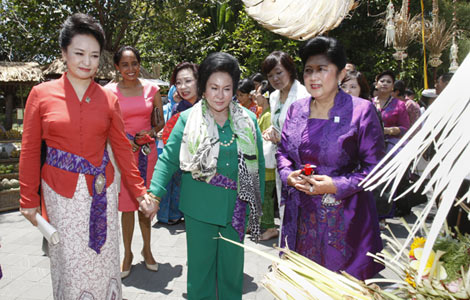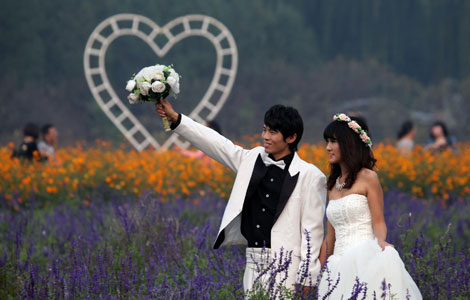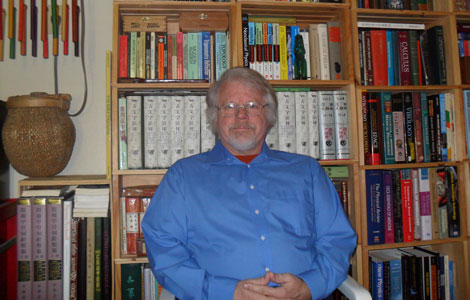Beauty still lies in the eye(s) of the beholder, or does it?
Updated: 2013-09-26 10:48
By Kelly Chung Dawson (China Daily)
|
|||||||||
CBS host Julie Chen's recent confession that she had undergone surgery early in her career to appear less Asian was met with both criticism and praise, including comments from the newly crowned New York-born Miss America, Nina Davuluri, who herself faced a backlash for being the first Indian American to win that title.
In the aftermath of her win, Davuluri was called a terrorist and labeled un-American. "She is representing America doing an Indonesian dance," one user Tweeted of Davuluri's Bollywood-style performance, underscoring the bottomless well of ignorance that seems to open up when diversity is celebrated in the public arena. It should be noted that Davuluri was cautioned against performing an ethnic dance, but did so anyway and won.
"I don't agree with plastic surgery, but I can understand that from a standpoint," Davuluri told USA Today in comments about Chen's revelation. "More importantly, I've always viewed Miss America as the girl next door, and Miss America is always evolving. I wouldn't want to change someone's looks. Be confident in who you are."
For a pageant queen who was only recently exposed for having made fun of the last Miss America's fluctuating weight after her own struggle with bulimia, the controversy around her right to be Miss America and the pressure Asian American women feel to meet culturally ingrained beauty standards in America is all the more significant.
As a young reporter in Ohio, Chen was told that she would never be an anchor because of her heritage, she revealed recently on the television show The Talk.
"Let's face it Julie, how relatable are you to our community? How big of an Asian community do we really have in Dayton?" her boss asked her. "On top of that because of your heritage, because of your Asian eyes, I've noticed that when you're on camera, when you're interviewing someone you look disinterested and bored because your eyes are so heavy, they are so small.'"
Chen later backtracked, telling People magazine that her goal in undergoing blepharoplasty, or "double-eyelid surgery," was not a rejection of her heritage but only an attempt to look more alert.
Her critics have accused her of selling out, of giving in to Western standards of beauty, but her current stature and success are also a testament to the efficacy of hewing to the norm.

Some cultural critics have noted that Davuluri's skin tone would have prevented her from winning a beauty pageant in India, which, like most Asian cultures, views a lighter skin tone to be more desirable.
Euny Hong, the author of the upcoming The Birth of Korean Cool: How One Nation Conquered the World Through Pop Culture and a Wall Street Journal piece entitled "I got Eyelid Surgery, but not to look White", said that the controversy around Chen's announcement was overblown. While procedures like skin-bleaching can have long-term detrimental impact on a person's health, there are no health issues related to double-eyelid surgery, she said.
"These are rational decisions and not necessarily evidence of racial self-hatred," she said. "Also, the truth is that it's a no-win situation. There's a tendency in the media to make all beauty decisions seem like bad decisions. Whether they're Miss America or a TV journalist, they should not be put in the place of having to defend their own beauty decisions. Often these choices are about conformity and pressure all women feel, rather than about race."
But Jenn Fang, who runs the Asian American issues blog Reappropriate.com, believes that the issues can't be divorced. The preference for larger eyes and lighter skin wasn't always the Asian ideal, and is rooted in the more recent history of Western racial and cultural dominance, she said.
"It's not cut and dry, because a woman who gets eyelid surgery does not necessarily want to be White, but on some level she is trying to achieve a Westernized ideal that is aesthetically appealing to the demographic that both Julie Chen and Nina Davuluri have to deal with in their chosen mediums," Fang said.
Both women face the conflicting pressures of needing to stand apart from their peers, while remaining accessible, she said. Though Asian women are increasingly viewed to be a palatable flavor of diversity in both the public and private spheres, minorities are still expected to tone down aspects of their persona that signal diversity. The uproar in response to both Davuluri's win is a reminder that diversity is often only acceptable as long as it remains relatable to the dominant culture, Fang said.
While Davuluri has told reporters that she is not surprised by the backlash against her win, she also noted that for every hate-filled Tweet, she's received a dozen well wishes and messages of support.
Contact the writer at kdawson@chinadailyusa.com
(China Daily USA 09/26/2013 page2)

 Firming friendships
Firming friendships
 A smog-filled Beijing targets polluting cars
A smog-filled Beijing targets polluting cars
 Animal welfare to be added in training
Animal welfare to be added in training
 Chasing the dragons
Chasing the dragons
 Boehner: US on path to default if Obama won't negotiate
Boehner: US on path to default if Obama won't negotiate
 New couples take wedding photos during holiday
New couples take wedding photos during holiday
 Williams beats Jankovic to win second China Open title
Williams beats Jankovic to win second China Open title
 Red alerts as Fitow closes in
Red alerts as Fitow closes in
Most Viewed
Editor's Picks

|

|

|

|

|

|
Today's Top News
Trending news across China on Oct 8
Japan, US start joint military drill
Kerry hails weapons destruction
Robust home sales during holiday
China calls on the United States to stay solvent
SF Chinatown honored
'E. Asia will lead global growth'
Beijing targets polluting cars
US Weekly

|

|







